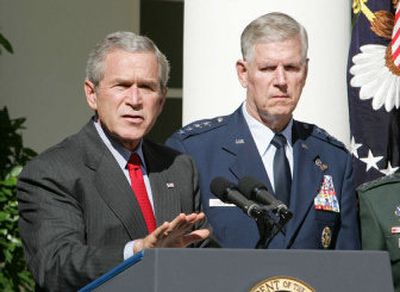Bush warns of more violence in Iraq

WASHINGTON – President Bush warned Wednesday that the bloodshed and violence by Iraqi extremists will escalate as the country moves into the last phase of its transition over the next three months – beginning with the referendum on a controversial new constitution on Oct. 15.
“We can expect they’ll do everything in their power to try to stop the march of freedom,” Bush warned during comments in the Rose Garden about terrorism.
In Iraq Wednesday, a female suicide bomber disguised in traditional male robes killed seven people and wounded at least 35 when she detonated explosives outside a police recruitment center in the troubled northwestern city of Tal Afar, according to Iraqi authorities. The bomber was believed to be the first female to carry out a deadly suicide attack in Iraq since U.S.-led troops ousted Iraq President Saddam Hussein in 2003.
The top U.S. general in Iraq Wednesday backed away from his suggestion, as recently as this summer, that the United States could begin a “fairly substantial” withdrawal of troops early next year. “I think, right now, we’re in a period of a little greater uncertainty than when I was asked that question back in July and March,” Army Gen. George W. Casey Jr., who is in charge of combat operations in Iraq, told reporters after a closed-door Senate briefing Wednesday.
After talks with Casey and Army Gen. John Abizaid, Bush expressed confidence that the U.S.-led campaign to quell Iraq’s insurgency can deal with a further escalation. “Our troops are ready for it,” he said.
For all the public confidence, however, the Bush administration in private is nervous about this sensitive last stage, which will establish whether Iraq’s disparate religious and ethnic factions can stay together in a single nation – and whether civil war can be avoided, according to U.S. officials and experts on Iraq.
The administration has come under growing pressure at home and abroad over the past two weeks, with dire warnings from Arab allies and a prominent international group about the looming disintegration of Iraq. In an unusual public rebuke of U.S. policy, Saudi Arabia’s foreign minister called a news conference in Washington last week to predict Iraq’s dissolution. He said there is no leadership or momentum to pull Iraq’s Shiites, Sunnis and Kurds back together and prevent a civil war. Other countries have expressed similar concerns in private, according to U.S. and Arab diplomats.
With Bush’s approval ratings already the lowest of his presidency, the administration is also facing an increasingly visible antiwar movement at home, from a weekend demonstration of about 100,000 people in Washington to a new “Out of Iraq” congressional caucus. The caucus, which has 68 members, all Democrats, is mounting a campaign to withdraw U.S. troops.